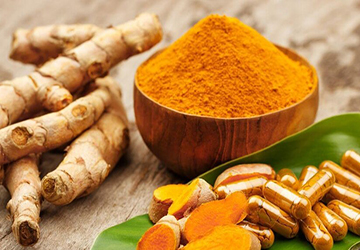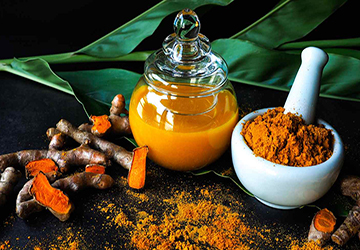Turmeric, a golden-hued spice, has been a staple in traditional medicine for centuries. Not just a flavor enhancer in the culinary world, this root is enriched with multiple health benefits thanks to its active ingredient: curcumin. As we delve into the health wonders of turmeric and curcumin, you'll discover why these elements deserve a rightful place in our diets.
When we discuss turmeric health benefits, we refer to a gamut of advantages it offers:
● Anti-Inflammatory Powerhouse: Chronic inflammation is a root cause of many diseases. Turmeric, rich in curcumin, naturally battles this inflammatory state. Hence, it's no surprise that it has found a place in the list of anti-inflammatory foods.
● Antioxidant Boost: Turmeric doesn't just stop at fighting inflammation. It's also known to boost the body's antioxidant enzymes. Curcumin, in particular, neutralizes harmful free radicals which can cause cellular damage.
● Natural Antiseptic: For minor cuts and burns, a turmeric paste can be a quick remedy due to its natural antiseptic properties.
● Brain Functionality: Early research suggests that turmeric might assist in increasing the brain hormone BDNF. This hormone is known to delay or even reverse brain diseases and age-related decreases in brain function.

Turmeric and curcumin are leading the charge in the growing trend of spice medicine. The focus here is on foods and spices that naturally reduce inflammation. With the rise in diseases related to chronic inflammation, there's an increasing shift towards using food as medicine. And turmeric isn't the only one in the spotlight; other anti-inflammatory foods include ginger, black pepper, and green tea.
Spice medicine emphasizes the importance of holistic health, integrating the power of these natural healers into daily life, and understanding that prevention can be just as crucial as cure.
Incorporating curcumin into a diet can be a game-changer for health enthusiasts. It's not just about adding turmeric powder to your dishes. Here's how you can make the most of it:
● Golden Milk: This is a traditional drink made by simmering turmeric in milk. You can add a pinch of black pepper to enhance curcumin absorption.
● Turmeric Teas: Herbal teas with a turmeric sprinkle can be refreshing and health-boosting.
● Spice Blends: Introduce turmeric into your favorite spice mixtures. It pairs wonderfully with other spices in curries, soups, and stews.
● Supplements: Curcumin supplements are available if you're aiming for a more concentrated dose. However, please consult a healthcare professional before adding them to your routine.
While turmeric is a jewel in anti-inflammatory foods, looking at the bigger picture is crucial. Combining turmeric with other anti-inflammatory ingredients can magnify its effects. Some popular allies include ginger, omega-3-rich fish, berries, and green tea. A diverse diet with these ingredients can set a foundation for a healthier life.
The idea of spice medicine isn't novel. Our ancestors have turned to nature's pharmacy long before synthetic drugs existed. Turmeric is one such gem in this age-old practice. With its rich history in Ayurveda and traditional Chinese medicine, its uses range from treating respiratory conditions to alleviating pain.
But why the resurgence in interest? As more individuals become wary of side effects from synthetic drugs, there's a pivot towards natural, holistic remedies. Spices, especially power-packed ones like turmeric, are leading this revolution.
Digestive issues plague many individuals in today's fast-paced world. Fortunately, turmeric comes to the rescue:
● Digestive Aid: The anti-inflammatory properties of curcumin can soothe an upset stomach, reduce gas and bloating, and facilitate digestion.
● Gut-Brain Connection: Recent studies indicate that curcumin might play a role in gut-brain communication, potentially aiding mental health issues such as depression and anxiety.
● Boosting Good Bacteria: Curcumin has shown promise in promoting the growth of beneficial gut bacteria, balancing our internal ecosystems.

For those suffering from joint-related issues, turning to turmeric might be beneficial:
● Arthritis Relief: Its natural anti-inflammatory properties can reduce pain and swelling in arthritis patients.
● Enhanced Mobility: Regular consumption might improve joint flexibility and reduce stiffness.
Nature's beauty secret might be turmeric:
● Acne Treatment: Its antibacterial properties can combat acne-causing bacteria.
● Anti-aging: Curcumin's antioxidant properties can reduce signs of aging by combating free radicals.
● Natural Glow: A turmeric mask can brighten the skin and provide a natural glow, though users should patch-test first to avoid potential allergic reactions.
Heart health is crucial, and turmeric might play a role in keeping our hearts pumping:
● Reducing Cholesterol: Studies suggest turmeric can help reduce LDL cholesterol levels.
● Protection against Heart Disease: Its antioxidant and anti-inflammatory properties can potentially reduce the risk of heart disease.
Turmeric isn't just for the body; it's for the mind, too:
● Mood Regulation: Preliminary studies suggest that curcumin might play a role in elevating mood and combating depressive disorders.
● Cognitive Function: The potential of turmeric in boosting brain-derived neurotrophic factors could enhance memory and cognitive functions.
The adoption of turmeric health benefits in modern medicine is growing:
● Clinical Trials: Increasingly, curcumin is being studied in clinical settings to understand its efficacy in treating diseases like cancer, Alzheimer's, and more.
● Bioavailability Concerns: Scientists are exploring ways to increase the bioavailability of curcumin, ensuring we get the most out of this powerful compound.
In essence, the health wonders of turmeric and curcumin are vast and varied. From its place in spice medicine to its role in anti-inflammatory foods, there's more to this golden spice than meets the eye. Incorporating turmeric health benefits by integrating curcumin into the diet can be a significant step toward holistic well-being. Remember, it's always best to consume in moderation and consult with healthcare professionals before making any substantial dietary changes. We hope you find this guide helpful.